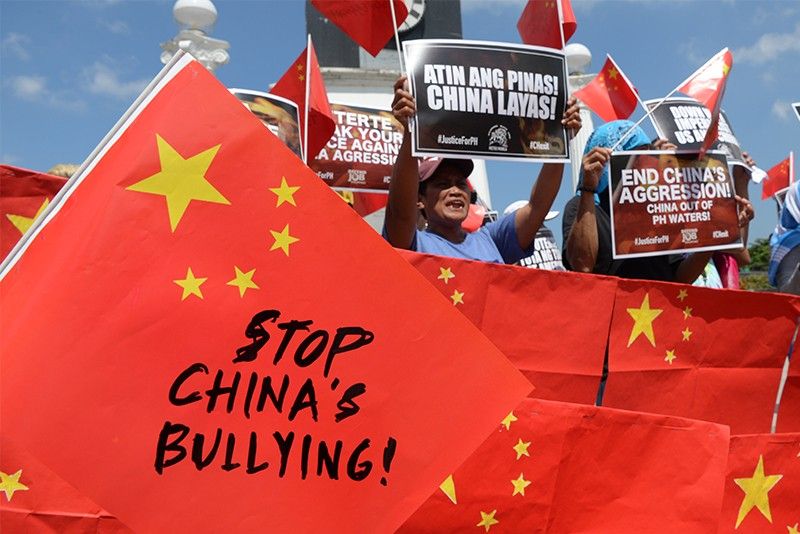Commentary: The arbitral ruling five years later

New satellite images show that swarms of Chinese ships have been dumping sewage and waste in the West Philippine Sea, damaging coral reefs and threatening the food supply of millions in the region. During a recent international conference organized by Stratbase ADR Institute (ADRi), a US-based geospatial imagery tech firm, Simularity, shared their analysis and data showing sewage runoffs from Chinese ships in the West Philippine Sea are "so intense you can see it from space."
Earlier this year, nearly 300 Chinese Maritime Militia vessels were spotted in the area of the Julian Felipe (Whitsun) Reef in the West Philippine Sea, well within the Philippines' exclusive economic zone. Despite the efforts of our Departments of Defense and Foreign Affairs to formally protest these ships' presence, the Chinese government has refused to withdraw them.
This continued presence of hundreds of Chinese vessels within the Philippines' EEZ and their total lack of concern for the ecological and environmental damage they are causing to our marine resources underlines the Chinese government's focused strategy to intentionally set aside international law and the rule of law just to advance its expansionists agenda. Simultaneously, the lack of resistance from Malacañang also exposes the extent of President Rodrigo Duterte's ongoing appeasement policy towards China.
During the same Stratbase ADRi conference, former Foreign Secretary Albert del Rosario pointed out some of Duterte's drastic foreign policy shifts since assuming office. For instance, the president decided that instead of protecting the country's 200-nautical mile EEZ, that the Navy would only be patrolling a 12-nautical mile territorial sea of the Philippines, he entered into a verbal agreement with President Xi Jinping allowing Chinese fishermen to fish in our EEZ, and has constantly dismissed and belittled the arbitral ruling that the Philippines won against China in 2016.
"It is certainly disturbing to see our president—who should be looking after his own people—relying on a foreign leader for his security of tenure as president. Moreover, such foreign leader represents an aggressor that is openly and illegally occupying land and waters that belong to the Filipino people," Del Rosario said.
It has now been five years since the Philippines won the arbitration case it lodged against China at the Permanent Court of Arbitration (PCA) in The Hague, Netherlands, which invalidated China's nine-dash line claim that covered nearly the entire South China Sea.
The ruling represented a massive victory for the Philippines and its territorial dispute with China. However, the Duterte administration has refused to invoke the ruling and has instead maintained a defeatist approach to China and the West Philippine Sea.
Earlier this year, the president said, "for the record, we do not want war with China. China is a good friend. We owed it a big debt of gratitude, among others, for the vaccines [it has donated to us]." "So China, let it be known, is a good friend, and we do not want trouble with them, especially a war," the president added.
This defeatist narrative has allowed the commander-in-chief to sidestep his duty to uphold the 2016 arbitral victory to appease "good friend" China. Unfortunate, since the arbitral victory is perhaps the best counterexample to the narrative that small states cannot stand up to China.
Indeed, the Philippines has not maximized the arbitral victory in its territorial dispute with China. However, as Stratbase ADRi President Prof. Dindo Manhit pointed out, "the rising tensions in the West Philippines Sea have become more than just an issue of conflicting territorial claims. The security challenges brought by China's aggressive behavior in the region will seriously impact the future of the Philippines and other states in the Indo-Pacific."
Speaking at the Stratbase ADRi conference, former Australian Foreign Minister Julie Bishop said that, "like many nations, Australia has experienced good times and more difficult times in our relationship with China. We're going through a difficult challenge at the moment. It has become more challenging since China has adopted a more assertive stance, particularly in foreign policy."
Former Foreign Secretary of India, Amb. Lalit Mansingh also echoed this concern and said that "the Indo-Pacific region is facing a challenge from an aggressive and hegemonic China. A country that questions the very idea of the international order based on respect for territorial integrity, sovereignty, the rule of law, and freedom of access to global economies."
Clearly, new and stronger forms of cooperation and collaboration among concerned states are needed to preserve our rules-based international order against China's increasingly more assertive foreign policy strategy.
For instance, Mansingh suggests that the ASEAN needs to look at initiatives like the Quadrilateral Alliance (Quad), made up of the United States, India, Japan and Australia. "The Quad, which shares its values system with ASEAN, will certainly welcome ASEAN dialogues on even limited issue-based cooperation with leading powers like Indonesia, Vietnam, Malaysia, and the Philippines," Mansingh said.
During the conference, it was clear that in addition to the Quad, many like-minded states celebrate the Philippines' arbitral victory against China and remain committed to upholding a rules-based international order. But, unfortunately, it was also clear that the Philippines has yet to galvanize this support, nor has it sufficiently invoked the 2016 arbitral ruling.
Earlier this week, we marked the fifth year since the Philippines won its case in the PCA, yet Chinese ships remain moored in the Philippines' EEZ, damaging coral reefs and threatening the region's food supply.
Let this serve as a reminder for us Filipinos to continue to call for our government to uphold the 2016 arbitral victory, defend our sovereign rights in the West Philippine Sea, and preserve a rules-based international order in the region.
- Latest





























